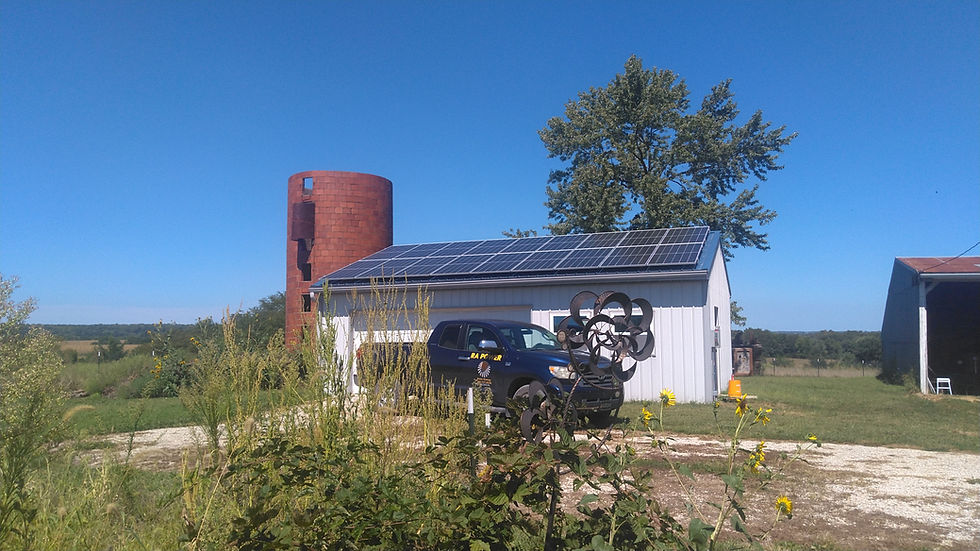Big Beautiful Bill Slashes Residential Solar Tax Credit, Effective January 1, 2026.
- Jul 14, 2025
- 3 min read
The End of the Residential Energy Tax Credit: What Homeowners Need to Know Before It's Too Late

The elimination of the residential energy tax credits marks a pivotal moment for homeowners looking to invest in energy-efficient upgrades and renewable energy. While these programs have made green improvements more accessible and affordable, they won’t be around forever.
By taking action before the upcoming deadlines, homeowners can make significant strides toward energy independence, reduce their environmental impact, and save money in the process. If you've been on the fence about making upgrades, now is the time to commit.
A Brief Overview of the Residential Energy Tax Credit
The Energy Efficient Home Improvement Credit and The Residential Clean Energy Credit were introduced to encourage homeowners to reduce their environmental footprint. It provided a significant financial incentive to invest in renewable energy sources and energy-efficient home improvements.
Why These Tax Credits Matter
Energy-efficient home improvements and renewable energy installations don’t just benefit individual homeowners—they also contribute to national goals of reducing greenhouse gas emissions and moving toward energy independence.
By offsetting a significant portion of the initial investment costs, these credits have driven widespread adoption of solar panels and high-efficiency heat pumps, among other upgrades. Homeowners have enjoyed both immediate savings through tax benefits and long-term gains via lower energy bills.
The Looming End of Popular Credits
While these programs have been instrumental in the growth of clean energy adoption, many of them are set to expire soon. Without congressional renewal or extension, several major tax credits will sunset in 2025.
Here’s a look at some of the most important credits nearing their end:
1. Solar Investment Tax Credit (ITC)The Solar ITC has been one of the most impactful federal incentives, providing homeowners with a tax credit worth 30% of the cost of installing a solar energy system. This credit has played a huge role in making solar energy mainstream and financially viable for everyday homeowners.
Expiration Deadline: December 31, 2025.
2. Heat Pump Tax Credit Heat pumps offer an energy-efficient alternative to traditional HVAC systems, providing both heating and cooling using less electricity. Homeowners installing qualifying heat pumps have been eligible for a 30% tax credit, helping offset installation costs.
Expiration Deadline: December 31, 2025.
3. Electric Vehicle (EV) Tax Credit The EV tax credit has encouraged countless Americans to transition to electric vehicles, offering up to $7,500 for new EV purchases and up to $4,000 for qualifying used EVs. This credit not only supports cleaner transportation but also reduces dependence on fossil fuels.
Expiration Deadline: September 30, 2025.
4. Geothermal Heat Pump Credit Geothermal heat pumps are among the most energy-efficient and environmentally friendly heating and cooling options available. The 30% tax credit has helped mitigate their higher upfront costs, making this cutting-edge technology more accessible.
Expiration Deadline: December 31, 2025.
5. Energy Efficient Home Improvement Credit This credit supports a variety of home upgrades, including new windows, doors, insulation, and other improvements that enhance energy efficiency. Homeowners can claim credits to offset up to 30% of qualified expenses, making even smaller projects more affordable.
Expiration Deadline: December 31, 2025.
What Happens If You Miss the Deadline?
Failing to take advantage of these tax credits before they expire means potentially leaving thousands of dollars in savings on the table. Beyond missing out on immediate tax benefits, homeowners will face higher upfront costs when making energy-efficient improvements in the future.
How to Take Action Now
If you’ve been considering an energy upgrade, now is the time to act. Here are a few steps you can take to ensure you maximize your benefits:
Evaluate Your Home’s Needs: Identify areas where you can improve efficiency—such as old HVAC systems, outdated windows, or insufficient insulation.
Get Quotes and Schedule Work Early: As the deadlines approach, demand for qualified contractors will rise. Booking early helps you avoid delays and secure better pricing.
Consult With a Tax Professional: Ensure you understand the eligibility requirements and documentation needed to claim your credits correctly.


Comments